0 Volumes
No volumes are associated with this topic
Lumpers, Splitters and Technicians: The Framers of the American Constitution
 Half a dozen distinguished colonists came to believe the thirteen American colonies could not survive unless they banded together. Eight years of bitter experiences during the Revolutionary War had taught them they must unite. We might call them lumpers.
Half a dozen distinguished colonists came to believe the thirteen American colonies could not survive unless they banded together. Eight years of bitter experiences during the Revolutionary War had taught them they must unite. We might call them lumpers.
The Lumpers
No one in the colonies and few in the whole world dared to disagree openly with George Washington at the end of the Revolution. He was born in the tenth generation of settlers in the new world, and so close to the richest man in his country that it didn't matter who was richer. At that moment, Virginia of which he was the leader, was by far the largest of the colonies and had been so for a century. He had nothing visible to gain by rebelling against the King of England, everything to lose, and almost did lose. And when he was finally victorious, he achieved the praise of that King for renouncing any idea of high office as a reward. If he said we should unite, not everyone would agree, but no one dared to oppose the man save for whom they all might have been hanged.
Washington was no scholar. His idea was scarcely more than a soldier's belief he was not expected to lose a war, and that if you were strong, people would leave you alone. Robert Morris had effectively been president of the country while Washington was entrenched at Valley Forge and much more sophisticated ideas of what it takes to run a nation. Morris was a wealthy merchant and knew you didn't win wars if you had no gunpowder, and you couldn't buy gunpowder if your allies didn't pay their promised taxes. Ben Franklin was probably the most talented man who ever lived and knew five kings by their first names. He never made a penny from electricity but would have won a Nobel Prize if there had been one. He went from poor to rich three times, and although he was never a revolutionary, he was a life-long rebel, deeply offended by his King who thought he know more about lightning rods than Ben Franklin, just because he owned the Cathedral that was thunderstruck by it. And Madison was a scholar of constitutions, who though devising the Constitution was more important than getting a nation to follow it. Gouverneur Morris was an aristocratic lawyer who reduced a summer of discussion to a few pages of terse verse. After an unbelievably short spurt of writing, he produced a masterpiece of condensation and then disavowed it when his lesser colleagues abandoned its principles in the War of 1812.
IF ALL MEN WERE ANGELS, NO CONSTITUTION WOULD BE NECESSARY
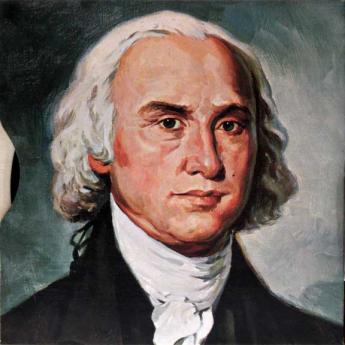
|
| James Madison |
JAMES Madison, Washington's floor manager at the Constitutional Convention of 1787 in Philadelphia, stated the main necessity for holding the Convention at all arose from selfish and untrustworthy human nature. The assembly probably understood exactly who he had in mind, although that is a little unfair to residents of Virginia. He really meant everybody. In the theology of the time, mankind was stained with original sin. Particularly in France, many 18th century romanticists responded to the Enlightenment by defiantly declaring human nature is born pure in heart. In their view, current evils grow from the pollution of civilization, without which it might be possible to have no government at all. At its root, such romanticism was an outcry against progress and civilization, blaming the world's troubles on the Industrial Revolution, so to speak. From Madison's skeptical viewpoint, the most awkward feature of the Romantic Period was its adoption by his Francophile friend and neighbor, Thomas Jefferson, the current American ambassador to France. Madison recognized that Jefferson and Patrick Henry were prepared to assail any attempt to add the slightest power to a central government, particularly if it weakened the power of Virginia. As indeed they promptly came forward to do and nearly succeeded.
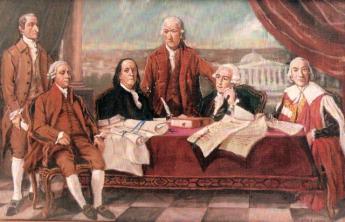
|
| Treaty of Paris |
After fighting an eight-year war for freedom, American belief was wide-spread that it was time to draw back from such anarchy. But there was widespread suspicion in every other direction, too. England seemed to concede, not defeat but only current military overstretch, possibly displaying reluctance to see its former colonies with full sovereignty. George III might wait for America to weaken itself and then try to take them back. Britain almost couldn't do anything right; it was also possibly up to no good when the Treaty of Paris astonishingly conceded land to the Mississippi instead of stopping at the Appalachians. Even our ally France nursed regrets for its somewhat older concessions after the French and Indian War. If even the two mightiest nations of Europe could not maintain order in the vast North American wilderness, perhaps they felt the inexperienced colonies would soon collapse from the effort. Further intra-European wars seemed likely, and could soon spread from Europe to the Western hemisphere. The guillotine was bad enough, Bonaparte would be worse. Our governance as a league of states was in fact, only a league of armies. The Articles of Confederation would not quell inter-state rivalries in peacetime, as only four years (1783-87) experience after the Treaty of Paris were clearly foreshadowing. It was time we listened to Benjamin Franklin, who had been arguing since the Albany Conference of 1745 for unification of the colonies, and to Robert Morris who had been arguing for a written constitution since 1776, a bicameral legislature since 1781, government by professional departments instead of congressional committees, and the ability to levy national taxes -- since at least 1778. Professor Witherspoon of Princeton had provided some ideas about how to make these proposals self-enforcing, Washington was firmly behind a Republican system and opposed to a monarchy. On the other hand, everyone knew that under the Articles of Confederation the thirteen States had often refused to pay their share, abused their ability to deal independently with foreigners, dealt unfairly with their neighbors, and capriciously mistreated their own citizens. It was time to act boldly. With a blue-ribbon convention of national heroes behind these simple ideas, surely it would be possible to convince the sovereign state legislatures to dethrone themselves.
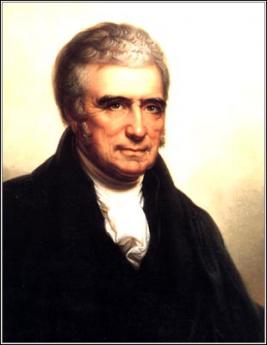
|
| John Marshall |
Two men quietly applied even deeper thinking than that; Benjamin Franklin of Pennsylvania, and John Marshall of Virginia. Both of them had served in state legislatures, both were dismayed by the experience. Franklin also had a long period of close-up observation of the British Parliament, suffering personal abuse there, and had reason to reflect on the earlier abuses by that Parliament under Cromwell during the English Civil War. Certain bad tendencies seemed universal in legislative bodies. Although John Marshall was not a member of the Virginia Constitutional delegation in 1787, he was active in the politics of the group it represented back home. Both Marshall and Franklin had reason to be uneasy about misbehavior in representative bodies, whether called legislatures, congresses, or parliaments. When people said states misbehaved under the Confederation arrangement, they really meant legislatures misbehaved. Franklin did what he could within the Convention to curb this observed behavior by enumerating limited powers and endorsing power balanced against power. When he had nudged it as far as he could, he wearily agreed to give the product a try. Franklin did not trust Utopias, but he had lived among Quakers for years, observing one Utopian society which seemed to endure without resorting to tyranny.
The Constitutional provisions in Article I, Section X became the heart of what the 1787 Convention wanted to change about the relationship of the national and state governments.
States are forbidden to ...
"emit bills of credit, make anything but gold or silver a legal tender in payment of debts, pass any bill of attainder, ex post facto law, or law impairing the obligation of contracts."
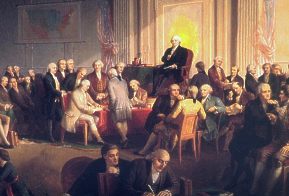
|
| 1787 Convention |
This brief clause is almost a presentment of what state legislatures were doing, which serious patriots regarded as wholly unacceptable. Failure of states to abide by the terms of international treaties must be included in such a summary, although the new Constitution went beyond the powers of states by locating treaties beyond the power of even Congress to change, once ratified. Some observers in fact feel that within the First Article clause, protecting the sanctity of contracts was really the nut of the matter. In one way or another, most states seemed to resort to paying their debts with inflation, somehow failing to recognize that borrowing never pays debts, it only postpones them. The great bulk of this new nation's business was to be conducted as voluntary agreements between two contracting parties. The State -- and the states -- were to stay out of the private sector, except as referee, to see that both sides kept their agreements. As a footnote, the matter of government intervention in private affairs was to rise again in the behavior of the Executive branch in the 1937 Court Packing uproar, and in the 2009 health insurance legislation. Some critics, therefore, have discomfort that the heaviest Constitutional weight was placed by the Founding Fathers on protecting private property. Are not other issues more important, they ask, like life, liberty and the pursuit of happiness? The Founders, of course, we're here not ranking benevolences by value; they were stating principal urgencies for convening the meeting. In a strange unintended way, they here stumbled on the right to property as the foundation for all other rights. But John Marshall understood it was true and was to spend thirty years hammering it into place. People broke individual promises by defaulting on debts; they simply did the same as governments, using inflation.
George Washington Demands a Better Constitution
GEORGE Washington was a far more complex person than most people suppose, and he wanted it that way. He was born to be a tall imposing athlete, eventually a bold and dashing soldier. On top of that framework, he carefully constructed a public image of himself as aloof, selfless, inflexibly committed to keeping his word. Parson Weems the biographer may have overdone the image a little, but Washington gave Weems plenty to work with and undoubtedly would have enjoyed overhearing the stories of the cherry tree and tossing the coin across an impossibly wide Potomac. Washington had a bad temper and could remember a grievance for life. He married up, to the richest woman in Virginia.

|
| Potomac River |
Growing up along the wide Potomac River, Washington early conceived a life-long ambition to convert the Potomac into America's main highway to the Mississippi. He did indeed live to watch the nation's new capital start to move into the Potomac swamps across from his Mount Vernon mansion, in a city named for him. For now, retiring from military command with great fanfare and farewells after the Revolution, he returned to private life on this Virginia farm. He made an important political mistake along this path, by vowing in public never to return to public life. During the years after the Revolution but before the new Constitution, his attention quickly returned to building canals along the Potomac River, deepening it for transportation, and connecting its headwaters over a portage in Pennsylvania to the headwaters of the Monongahela River -- hence to the Ohio, then the Mississippi, or up the Allegheny River to the Great Lakes. He personally owned 40,000 acres along this river path to the center of North America. The occasion for a national constitutional convention grew out of a meeting with Maryland to reach an agreement about this Potomac vision, which was being blocked by commercial interests in Baltimore. Ultimately, Baltimore won the commercial race; so it was the Baltimore and Ohio Railroad which captured the early commerce to the west. Washington also made deals, ultimately to Baltimore's benefit, with the James River interests, to give them a share of the development of the Chesapeake Bay trade. As a young man, George Washington had acted as a surveyor for most of this region, and as a young soldier had explored the Indian trade to Pittsburgh, actually starting the French and Indian War during this trip. He was to march it again later with Braddock's army. All the while, Washington dreamed of the day. There were competitors; Philadelphia and New York had similar aspirations for their rivers. Take a look at a globe or Google Earth. Comparatively few of the earth's rivers drain too far western beaches. Even today, long-term victory in worldwide water transportation will likely go to one of many eastern rivers linking up with one of the few western ones. The ultimate world-wide goal has yet to be fulfilled for what continues to be the cheapest of all bulk transportation methods.
Washington at age 54 was already richer than most people need to be; a lot of this Potomac dream was a residual of boyhood ambitions enduring into middle age. In a sense, he had the ambition to make his boyhood home the future center of the universe. Although much of his stock in these real estate enterprises resulted in very little extra wealth, he demonstrated his mixture of public spirit combined with ambition by donating the stock in one of the companies to a future national university, to be located across the river near Georgetown. Since that didn't work out, he later placed the nation's capital there. He had consistently been a far bolder dreamer than Cincinnatus, humble Roman citizen-soldier returning to his farm from the wars.
Washington more or less gave up this Potomac ambition for a loftier one. During the Revolution, he had suffered the most infuriating abuse of himself and his soldiers from the state legislatures. Their urgent demands for victories were seldom matched with resources. The Continental Congress representing those state governments in a weak confederation that could not feed and pay its own troops seemed little better. He could be a mean man to cross, but perhaps with General Cromwell in mind, Washington possessed the firmest and most sincere belief in the proper subservience of military to civilian control. These conflicting feelings resulted in earnest obedience to a group of politicians he surely distrusted. This could not be described as hypocrisy; he respected their rank even though he suffered from their behavior. When Congress paid the troops in worthless currency which they promised to redeem after the war, it became clear that either lack of moral fiber or their system of governance led the states and the Congress in the direction of dishonoring their debt to the soldiers. This was a dreadful system, which led to death and suffering among the loyal troops, forcing the General into the humiliating position of assuring the troops Congress would stand by them, while he privately doubted any chance of it. Washington did not easily forgive or forget. Here was a paltry outcome for eight years of war and suffering; this system of organized dishonor must be improved.
He went about achieving his goal in a way that would not occur to most people. He chose a young ambitious agent, James Madison, who had caught his attention in the Virginia legislature, in the Continental Congress, and in the negotiations with Maryland over the development of the Potomac. Washington schemed with the young man for weeks on end about ways and means, opportunities, dangers, and potential enemies. Perhaps he failed to notice some ways where he and Madison fundamentally differed. Madison himself might not have recognized that his years at Princeton in the Quaker state of New Jersey had exposed him to novel ideas like separation of church and state, which were instantly appealing to the two Virginia Episcopalian religious doubters. Many people he admired, Patrick Henry, in particular, wanted the government to be as weak and ineffective as possible. Unfortunately, when Madison's turn later came for assuming the Presidency, he went along with reliance on diplomacy and persuasion until it almost cost America the War of 1812. Acting as Washington's agent in 1788, Madison was assigned to win over the Virginia legislature, make alliances with other states in Congress, identify friends and enemies, make deals. He performed as brilliantly as he would at the Constitutional Convention, so the basic conflict between the soldier President and his politician assistant was glossed over. As long as the original relationship held together, Washington felt it was useful to remain above and aloof, publicly wavering whether this was all a good idea, but fiercely determined to have a nation he could be proud of. There was to be a Constitutional Convention in Philadelphia, but while Washington was invited, he let it be known he was uncertain whether he should accept the invitation. What he really meant was he would preserve his political credibility for a different approach if this one failed. Considered from Madison's viewpoint however, this clearly meant Washington would dump him if things went badly. Meanwhile, the unknown young Madison on several occasions came to Mount Vernon for three days at a time to talk strategy and give the famous General all the scoop. Today, we would describe Madison as a nerd. The aristocratic Gouverneur Morris never thought much of him. Washington needed him, but there is no evidence he thought of him other than as a glorified butler. Little Madison was awkward among the ladies, a problem inconceivable to either Washington or Morris. But that little mind was surely working, all the time.
Madison was in fact a brilliant politician, a dissembler in a different way, but a severe contrast with his mentor. To begin with, he was a scholar. Both as an undergraduate at Princeton and a graduate student working directly with the great Witherspoon himself, Madison was deeply learned in the history of classical republics. He spent an extra year at Princeton, just to be able to study ancient Hebrew with Witherspoon. But he was innately skilled in the darker arts of politics. When votes were needed, he had a way of persuading three or four other members to vote for a measure, while Madison himself would then vote against it to preserve influence with opponents for later skirmishes. In fact, as matters later turned out, it becomes a little uncertain just how convinced Madison was that Washington's strong central government was a totally good idea. Before and after 1787 Madison expressed a conviction that real sovereignty originated in the states, just as the Articles declared. That was a little too fancy for practical men of affairs, who were uncomfortable to discover how literal Madison was after his break with the Federalists. Twenty years younger than the General. he prospered in the image of being personally close to the titan, and he certainly enjoyed the game of politics. The new Constitution was going to be an improvement over the Articles of Confederation, but Madison did not burn for long with indignation about injustice to the troops, or disdain for nasty little politicians in the state legislatures. These were problems to be solved, not offenses to be punished. The new Constitution was a project where he could advance his career, skillfully demonstrating his prowess at negotiation and manipulation. This is not to say he did not believe in his project, but rather to suspect that he was a blank slate on which he allowed Washington to write, and later allowed others to over-write. He was eventually to modify his opinions as a result of new associations and partners, and since he succeeded Jefferson as President, it was personally useful to adjust his viewpoints to his timing. What would never change was that he was an artful politician, while Washington hated, absolutely hated, partisan politics.
This is not just an emotional division between two particular Virginia plantation owners, but an enduring thread running through all elective politics. Washington set the style for generations of citizen leaders in America. In his mind, a person of honor distinguishes himself in some way before he enters public office, so on the basis of that honorable image, presents himself to voters for public office, and naturally is elected to represent their interests. He is expected to compromise where compromise is honorable and publicly acknowledged, in order to achieve one desirable outcome in concert with other outcomes, in some ways inconsistent but still honorable in combination. He reliably will not vote for either issues or candidates in return for some personal consideration other than the worth of the issue or the candidate, with the possible exception of yielding to the clear preferences of his local district. Such a person is not a member of a political organization very long before he encounters another group of colleagues -- who regularly swap votes for personal advantage, join a group who agree to vote as a unit no matter what the merits, and recognize the frequent necessity to talk one way while secretly voting another. The first sort of politician is usually an amateur, the second type is typically a professional politician. Although it seems a violation of ethics and common public welfare, the fact is the professional vote-swapper almost always beats the sappy amateur. The response during the Eighteenth Century was for idealists to condemn and attempt to abolish partisanship and political parties. The American Constitution does not make provision for political parties and other forms of vote-swapping or even anticipate their emergence. Although Madison ignited the process in the United States, Jefferson really organized it; every recent politician except Adlai Stevenson has openly participated in a version of it. That the Constitution has still not been amended to provide for parties seems to reflect a persisting nostalgic hope that somehow we can return to Washington's stance.
Washington's conception of open representative politics was not entirely perfect, either. In order to maintain an image of impartiality, Washington and his imitators isolated themselves in a cloak, holding back their true opinions in a sphinx-like way that hampered negotiation. Unwillingness to be seen swapping votes can lead to an unwillingness to compromise, and in the final analysis, the difference is one of degree. However, the over-riding issue is that each representative or Senator is equal to every other one. When vote-swapping gets started, it leads to placing power over supposed equals in the hands of the more powerful manipulators, masquerading as political leaders. Ultimately, it leads to the adoption of house rules on the very first day of a session which force lesser members to surrender their votes to a speaker or minority leader or committee chairman, when the theory is that there is no such thing as a lesser member. The claim of a party-line politician is that he obeys the will of the party caucus; the reality is usually that he obeys the will of some tough, self-advancing party leader. The final reality is that most legislatures must now deal with thousands of bills per session, leading to the necessity of appointing someone to set priorities, which in turn leads to the power of party leaders over their grudging servants. These various subversions of the equal rights of elected representatives can lead to such discrediting of the system that honorable people may refuse to stand for office, leaving foxes in charge of the hen house. Benjamin Franklin, who was to play an invisibly controlling role in the impending Constitutional Convention, had his own way of coping with the political environment. "Never ask, never refuse, never resign."
A Gleam in Washington's Eye
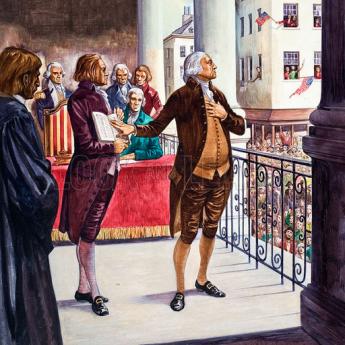
|
| George Washington Taking Oath |
On the eve of the Constitutional Convention, the nation was unhappy, confused, and dissatisfied; this wasn't what a victory was supposed to feel like. George Washington wanted a country to be proud of, big enough to discourage enemies, otherwise free of policing, regulation, or monarchy. Eight years of war had taught him it wasn't easy to have both liberty and discipline at the same time. Perhaps America was more unusually blessed, however, defended from invasion by oceans and wilderness, and from greed by a continent of natural resources. If order and justice could be organized, perhaps this by itself would enlist the loyalty of that mixture of classes and nationalities then flocking to our shores. Several important writers were having a strong influence on the era we now call the Enlightenment; David Hume and Adam Smith in Scotland, Edward Gibbon in England, Voltaire and Diderot in France, even Catherine the Great of Russia, with a thousand others including Benjamin Franklin and Robert Morris. Although Washington probably hadn't read them, Adam Smith's The Wealth of Nations showed unvarnished new ways of looking at commerce and politics, while Gibbon's The Decline and Fall of the Roman Empire showed what could happen if idealism gets neglected. Both books were published in the portentous year of 1776, describing many difficulties, but always suggesting problems could somehow be solved. There were plenty of ideas in circulation, but there was no plan.
It must have become obvious to Washington well before the Battle of Yorktown, that the Revolutionary War would not leave us with our problems solved. There was one brief moment as the British Army was withdrawing from Philadelphia in 1778 which seemingly justified boasts our troops had licked 'em. Just after the surrender of a whole British Army at the Battle of Saratoga, the British were also retreating from Philadelphia, and the Lord North offered generous peace terms through the Earl of Carlisle. No doubt the British public was restless after the Burgoyne defeat and the French alliance with America. Because the Carlisle episode is much more familiar in England than in America, perhaps it was a feint or a maneuver to embarrass the Earl of Carlisle or possibly just an exploration of the true state of affairs which were rumored about across a wide ocean. At any event, Gouverneur Morris was the visible American actor in this puzzling episode, but he must have been acting in concert with others. Lord North offered to give us our own elected parliament within a commonwealth; taxation with representation, no less. Morris seems to have dismissed this offer with contempt. But six more years of devastation ensued, surely convincing Washington that bitter defeat was still possible. That reality was concealed behind the graciousness of the French in allowing us to claim American troops had defeated the British at Yorktown. In fact, the preponderance of troop casualties, naval vessels and strategy had been French. The money had been mostly French as well. If that debt nearly bankrupted France, what might it have done to America?
Washington had been an outstanding athlete, soldier, and farmer, but his many travels about the colonies convinced him something more than leadership was needed. You just can't defeat a powerful enemy with short enlistments which give soldiers a legal right to go home on the eve of battle, and no way for the central command to extend the enlistments. To this, Robert Morris added that you can't buy gunpowder without the central power to levy taxes to pay for them. Morris warned him more was needed than a confederation so big others would leave it alone. Even temporary power wasn't enough. National disorganization had been just as bad after the Revolution as before. By 1787, Washington concluded the states just would not surrender power to a central national government unless the people forced them to give it up, and after a brief patriotic fervor, the people mostly wanted to go home for spring plowing. Peacetime also demonstrated another discouraging truth: meaningful improvement of the existing order meant the whole previous leadership class might leave public service to less qualified leaders, watching peace attract mediocrity to political office. Prominent men in the community gathered in a Constitutional Convention recognized the advantages of Union and devising peaceful ways to maintain it. After that transient moment when the memory of the war was fresh, politics could return to the mediocrities of a political class. That's not exactly what is now meant by "We, the People", but it might have to serve. In Washington's view, the voice of the people usually echoed along the lines of Tell us what good it would do to upset the Articles of Confederation, otherwise leave them alone. If you propose the general shape of a new central government, first tell us what it can do better than the states. And then show us how to make dubious state politicians agree to it. The accents of hesitation and defeat echo powerfully.
The hideous French Revolution was soon to demonstrate how unwise it was to look for short-cuts; we need a republic, not a stampeded democracy. George Washington was unsure just what was needed, but he knew a few basic things with certainty. America needed a bargain which everyone was expected to keep. A stronger central government should be provided for, and make it difficult to dissolve.
Robert Morris: Businessman Father of the Bureaucracy
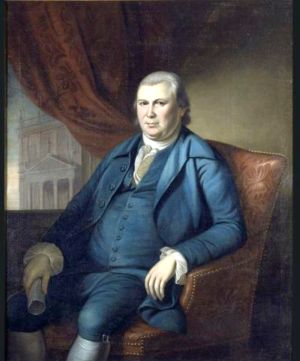
|
| Robert Morris |
UNDER the Articles of Confederation, America had a President who presided, but there was no executive branch for him to do anything administrative. The day to day business of the nation was conducted by committees of Congress, who mainly contracted out the actual work. Evidently, Robert Morris, the businessman had observed this system with displeasure, because it only took him a few days to replace it with departmental employees, reporting to him. The affairs of the nation were evidently in such disarray that there is scarcely any recorded resistance to this astonishing re-arrangement, probably viewed as only one of a series of brisk actions by this foremost businessman of the nation, acting in an emergency and to some extent using his own money. Furthermore, the immediate administrative improvement was apparently so obvious to everyone that the system continued after Morris left office, and was absorbed into the 1787 Constitution without much-recorded debate. Without dissent, as we say, the bureaucracy had been created. As the press of business steadily increased the bureaucracy, from a handful of employees to many millions of them, the fourth branch of government was created without any Constitutional mission statement, not one single word. Following directions set by early America's preeminent no-nonsense businessman, control of the bureaucracy was placed within the Executive branch, in time largely located within the District of Columbia, and governed by rules made by the Civil Service Commission. Sometimes this fourth and largest branch of government skirts dangerously close to encouraging insubordination to their politically appointed superiors.
For some reason, the State Department is particularly suspected of such "Yes, Minister" behavior. Increasingly, government subcontractors are relied upon ("privatization"), as the growth of public sector workforces a return to the subcontractor approach of two centuries earlier; such subcontractors increasingly find the bureaucracy assumes the role of the second Board of Directors. And for the same reason as before: the work of the central government keeps increasing. At a state and local level, an uncomfortable amount of political funding can be traced to utilities and other corporations who have been awarded legal monopolies, uncomfortably like the mercantilism which our colonist ancestors had found so repugnant to deal with. In the 21st Century, we are finally approaching the point where we can foresee the number of people working for some level of government becoming greater than the number of voting citizens, and therefore able to control their income and the nature of their work. When the bureaucracy begins to exert political election power over its elected superiors, elected politicians are almost certain to rebel at what they will surely see as going a step too far. However, on the topic of salary and work environment, they are likely to become allies. Public discontent is already echoed in the growing political movement to limit or shrink the size of government; it would be well to examine and pilot test alternative options before this one gets us into trouble.
In retrospect, this was one of many features of creating the three branches of government where broader implications went unnoticed in 1787. The British government had three branches, King, Parliament, and Judiciary. To create a government consisting of a President, a Congress, and a Judiciary did not then seem like much of a departure. However, the Revolution deposed the King and made the people sovereign. When the real implications of that breezy slogan had to be translated into legislative language serious implications emerged, unexpected then, and now hard to change.
John Dickinson, Quaker Hamlet
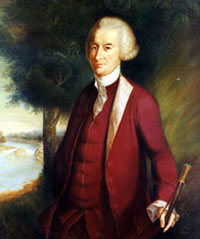
|
| John Dickinson |
John Dickinson (1732-1808) would probably be better known if his abilities were less complex and numerous. It would have been particularly helpful if he had consistently remained on only one side of the important issues of his day. Born in a Quaker family and buried in a Quaker graveyard, he was for years a notable Episcopalian and soldier. He outwitted John Penn, the Pennsylvania Proprietor who was trying to keep Pennsylvania from sending representatives to the Continental Congress, by having the Pennsylvania representatives hold a meeting in the same small room of Carpenters Hall at the same time as the Congress. But he ultimately refused to sign the Declaration of Independence. Although he was the main author of the Articles of Confederation, the Constitution which replaced it would not have been ratified without his idea of a bicameral Congress. Although he was Governor of Pennsylvania, he was also Governor of Delaware, has been the central figure in the separation of the two states. In fact, for fifteen years he was a member of the Legislature of both states. Dickinson seems in retrospect to have been on every side of every argument, but he was immensely respected in his time.
Two events seem to have been central in the organization of his life. The first was his education as a lawyer. At that time and for a century afterward, lawyers were trained by apprenticeship. Dickinson, however, studied in London at the Inns of Court for four years and was by far the most distinguished lawyer in North America for the rest of his life. Furthermore, he absorbed the principles of the Magna Carta and the approaches of Francis Bacon so thoroughly that he never quite got over his pride in his English heritage. Throughout his leadership of the colonial rebellion, he acted as a better Englishman than the English themselves. His demand was for American representation in the British Parliament, not independence from England. It would not be hard to imagine Dickinson standing before a firing squad, gritting the words of St. Paul, Civis Romani Sum.
His other pivotal experience was the Battle of Brandywine. Dickinson had been the organizer or chairman of the two main Pennsylvania military organizations, the Pennsylvania Committee of Safety and Defense, and the so-called Associators (today's 111th Infantry, the first battalion of troops in Philadelphia). Both of these particular names were a characteristic gesture to conciliating pacifist Quaker feelings. Nevertheless, when Dickinson refused to sign the Declaration, he did temporarily become so unpopular he resigned his military commands. A few months later, when General Howe landed at Elkton at the narrow neck of the Delmarva peninsula, Dickinson enlisted as a common soldier to defend the southern perimeter of the defense line Washington had hastily thrown up to defend Philadelphia. Shortly afterward, Dickinson's friend and neighbor Caesar Rodney made him a Brigadier General in charge of the garrison around Elizabeth New Jersey, but the Battle of Brandywine taught an important lesson. Little states like Delaware and Maryland could not possibly defend themselves witho
Constitutions: So What's So Good About Ours; Why Do Europe's Fail?
First of all, let's compare Philadelphia's Constitutional beginnings with Boston's. Philadelphia had a Constitution which grew out of the Revolution, which was forced upon us by Admiral Howe's punishing attack by a huge British fleet. Philadelphia was dominantly a Quaker pacifist city. Annoyed by British mercantilism it may have been, but it was far from completely hostile to the mother country. Boston, by contrast, could have been described as starting the war. It had the Boston tea party, the Boston massacre, and the hidden gunpowder before the British tried to restore order. Boston and Philadelphia both had grievances, but nobody challenges the statement that the colonists (and the smugglers) started the war which led to the Constitution, just as French revolutionaries attacked the French aristocracy, first. Boston and Paris started their wars, Philadelphia was attacked. Furthermore, Philadelphia was pacifist Quaker, and gave up political power rather than resist. Boston quickly gave up "Taxation without representation" in order to fight for Independence with allies; Philadelphia was still filled with Tory sympathizers after the war was over.
But although Philadelphia agonized about Independence, they took it seriously once they adopted the goal. Even decades later, they endured a Civil war for the Union, while Boston sent us Abolitionists to stir up trouble for the South. On a smaller scale, during the War of 1812 it was New England that hoped to invade Canada, while Philadelphia was harboring the French and building French buildings. Our Constitution has endured for over two centuries with only minor amendments. By contrast, the European Republics seems about to fail after uniting many small states into one big one. We have much the same heredity. Whatever needs to be changed, by Europeans, before someone gets blown up?
The first thing to acknowledge is that America's Constitution may be the unusual one, having survived longest. Other Constitutions backslid after a few years. No doubt we wanted success more; we worked harder at it. At first, we were very suspicious of any unification of nations at all, as eloquently proclaimed by Patrick Henry, the Lees and Mason. But John Dickinson also wasn't sure it was a good idea at first either, Ben Franklin was a dedicated Englishman right up to the edge of the Revolution, and the Penman of the Constitution, Gouverneur Morris, disavowed his own product during the War of 1812. James Madison the Virginia scholar of constitutions based his premise on the intrinsic evil of everyone, in the phrase. "If all men were angels, there would be no need of Constitutions." The idea behind having a Revolution was Patrick Henry's declaration, "Give me Liberty or give me death." He distrusted all centralized rule and rulers. Not only was George III corrupt, but most men in power soon became that way. All governments were evil, and the evidence seemed abundant. George Washington devised the best reply he could find. Over and over, he repeated his sorrowful experience, "If you are strong, people leave you alone." Unify, or die. Since Washington had led a revolution against Kings overcoming almost hopeless odds, he was offered anything he wanted and refused to take it. It was hard to believe he wasn't sincere. Furthermore, he was a rich slave-holder. He knew he must lead because no one else had the credentials to be trusted by both North and South. The largest colony was Virginia, which gallantly fought the war but almost drew back from the Constitution. Perhaps all this hesitancy and reluctance was the secret of our success. Perhaps we expected little to come of it unless we were vigilant. So we were vigilant. Our Constitution holds together because it is a permanent balance between those who want to go ahead and those who like what they have, and we can always change either one before they do much damage, but we can keep them long enough to gain a little.
Robert Morris was as rich as they come, too, so he could be trusted by movers and shakers. He knew his countrymen, back from the days when they almost killed him in the Battle of Wilson's House on Third Street, near the Quaker Meeting at Fourth and Arch, no less. He knew you didn't win wars without gunpowder, so the way to remain strong was to find a way to force, trick or bribe the component states to pay their taxes. At the Constitutional Convention, he talked more than anyone, said hardly anything once he got a workable system, and then almost didn't sign it until he was convinced it would work. Even after the document was ratified, Ben Franklin who had risen from poverty three separate times to be one of the richest men in town, who had been both the author of the most significant features of the Constitutional product and the author of its most significant compromises, has been revealed as a doubter even after giving it his best, commenting to Mrs Powell that it was, "A republic, if you can keep it." He had proposed a Union at the Albany Conference in 1745, but after forty-four years he still wasn't sure it would work. Without these four men and their friends, it probably wouldn't have. And then there was John Dickinson, Governor of Pennsylvania and Delaware simultaneously, who pulled James Madison aside in Independence Hall, and said, "Do you want a nation, or don't you?" when it came time to compromise on giving two senators apiece to both the small and large states. And don't forget Patrick Henry, whose role in the Bill of Rights was vital. This was a compromise; you need cooperation on both sides to achieve an enduring compromise. Neither side must be allowed to achieve a total victory, lest your Constitution be short-lived like the others. From the beginning, our Constitution was as weak as anyone could make it -- and still survive. The Founding Fathers were idealists who had almost lost a war. There was only one thing worse than winning a war, and that was to lose one.
What Is the Purpose of a National Constitution?
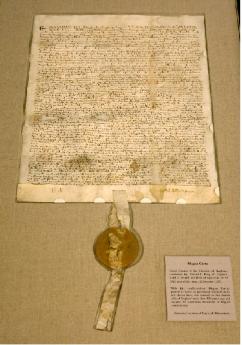
|
| 13th Century Magna Carta |
NATIONAL constitutions are mainly an outgrowth of the 18th Century Enlightenment, even though similar features are to be found among ancient legal codes. Those who trace the origins of the American constitution to the 13th Century Magna Carta will usually point to a central sentence of clause 39:
No free man shall be arrested, or imprisoned, or deprived of his property, or outlawed, or exiled, or in any way destroyed, nor shall we go against him or send against him, unless by legal judgement of his peers, or by the law of the land.
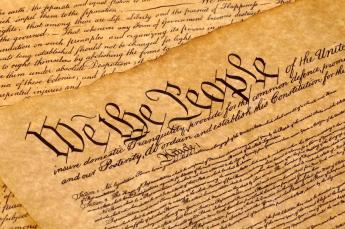
|
| American Constitution |
That's a pretty good beginning, a good example of a needed legal principle, but unrecognizable as what we would today call a Constitution. It states what a government may not do, but does not define the nature of a government which does the job best. Nor do even the many Enlightenment philosophers of government take that final step of outlining where their notions should take us until the American Constitution had been written and defended in the Federalist papers. Nowhere among the writings of Montesquieu (The Spirit of the Laws, 1748), Catherine the Great (Nakaz, Instructions to the All-Russian Legislative Commission, 1767), Diderot (Observations About Nakaz, 1774), James Madison (1787), John Dickinson(1763) or Gouverneur Morris(1787) can there be found much tightly described definition of a constitution. Certainly, there is no definition within the writings of Adam Smith if we look for rule-making among Enlightenment thinkers whose ideas were influential on the 1787 Philadelphia document. The American constitution was the product of many minds, before and after 1787. The outlines of its final form converged, and emerged, from the Constitutional Convention of the summer of 1787, with Gouverneur Morris as the penman of record. To him, we certainly owe its succinctness, which is the main source of affection for the document. That probably understates matters; in his diary of the secret meetings, James Madison records that Gouverneur Morris rose to speak about 170 times, more than any other delegate. Lots of thought and debate; ultimately, few words.
The Elizabethan Sir Francis Bacon has the greatest claim on devising a theory of law and law-making in the Anglosphere tradition. But his elegant modification of Galileo's scientific method, the English Common Law, is more a methodology for creating good laws than an outline of a nation's legal principles. Anyway, tracing the American Constitution back to an underlying British one tends to stumble when the British Constitution fails to meet a definition which would include our own. The British Constitution is said to be "unwritten" to the degree it is a consensus of revered documents. It can be amended by Parliament at will, has a variable history of defining just who is covered by it, and in order to define constitutional principles seems to rely on sentences extracted from difficult context. If the two constitutions had been written and compared at the same time, one would say the British had sacrificed coherence out of respect for tradition. In fairness, some features of the American constitution are also perhaps unnecessary for every constitution, but by surviving as the oldest constitution of the modern form, have become its model. That would be:
A set of principles governing the legitimacy of a nation's laws, and firmly standing above them. It defines its own domain, geographically and by the membership of a defined citizenry. Except as otherwise defined, it supersedes all other governance within its domain. It defines and defends its own origins. It includes a description of how to amend it, which is intentionally infrequent and difficult. It goes on to outline the structure of the laws it regulates, with subtle modifications made to channel the type of power structure which will govern.
In the American case, history and culture generated several other instabilities so central they justified heightening the difficulty to amend them to a Constitutional level, thus conferring undisputed dominance over competing principles of governance. That would be:
A separation of government powers weakened all potentially offending branches of government, and thus enhanced citizen liberty. Separation of church from state, for like purpose. A right of citizens to bear arms, to strengthen citizens' defense against internal or external attack, and perhaps also warning that revolt must be possible, even endorsed, as some final extremity of protection for citizen sovereignty.
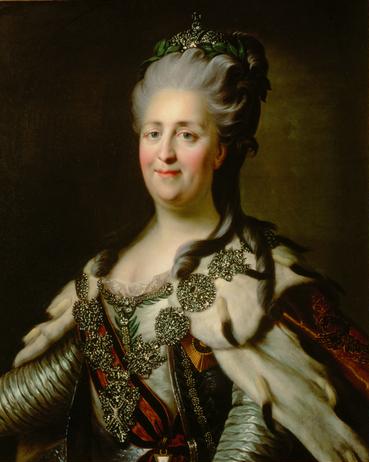
|
| Russia's Catherine the Great |
It enhances our comprehension to contrast the outcomes of competing 18th Century implementations of the Constitution idea. Russia's Catherine the Great proposed a constitution steeped in the traditions of the Enlightenment but ultimately designed to define and strengthen the role of the monarch. Denis Diderot her French protege recoiled at this viewpoint, substituting other views resembling those of Jean Jacob Rousseau. He opened Observations About Nakaz his commentary to the Queen, with the following declaration:
There is no true sovereign except the nation; there can be no true legislator except the people. Whether looking back to the English Civil War or forward to future disputes between the Executive and Legislative branches, it makes clear the Legislative branch was dominant, with the Executive branch acting as its agent.
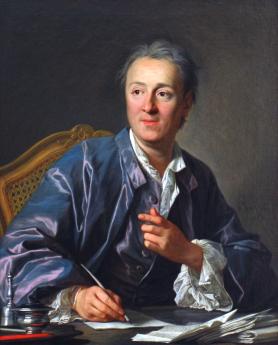
|
| Denis Diderot |
With this ringing warcry, the French model nevertheless ushered in the extremes of the Terror, the Guillotine, and the Napoleonic conquests. The consequences of the French constitution undermined world confidence in the benevolence of public opinion, at least deeply confounding those for whom the democratic rule was not totally discredited. Once more new life was breathed into allegiance for the monarchy, military rule, and dictatorship. Public opinion, it seemed, was not either invariably benign or comfortably far-seeing. The noble savage, mankind naked of tainted civilization, was not necessarily wise or worthy of trust. Edward Gibbons, the 1776 author of The Decline and Fall of the Roman Empire was pointing out where it all might lead if we completely believed in the collective goodness of the human condition. At the least, the failure of the French Revolution complimented the viewpoint of the Scottish philosopher, Adam Smith, who also in 1776 emphatically urged a switch in that reliance toward a sense of enlightened self-interest, as follows:
It is not from the benevolence of the butcher, the brewer, or the baker, that we can expect our dinner but from their regard to their own interest.
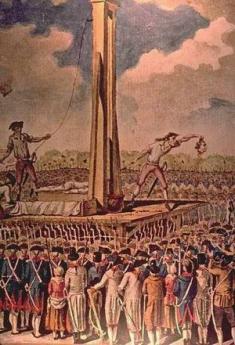
|
| Terror, the Guillotine, |
It is not surprising that Diderot rejected the Leibniz view of things that "All is for the best, in this best of all possible worlds." And, in view of his dependence on Catherine, not surprising he did not publish his rejection of it until 1823. Thomas Jefferson was in France as ambassador during the time of the American Constitutional Convention, fearing to confront George Washington; and likewise keeping his conflicting views private for several years. Eventually, they surfaced in the creation of an anti-Federalist political party along with the conflicts which kept the new nation in a turmoil for the following forty years. It is surely a testimony to the strength of the Constitution's design that the country was able to shift between such extreme governing philosophies but still hold together without changing the governing statement of purpose. Indeed, it is plausible to contend that our two political parties still continuously debate the useful tension between these two differing opinions.
Inalienable Rights Before the Magna Carta
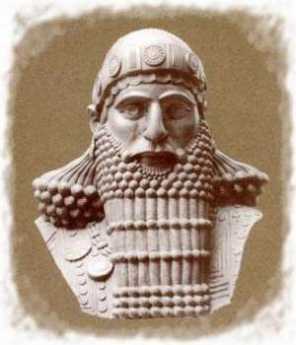
|
| Hammurabi |
Although we have had Judges for thousands of years, it's only one of the three branches of American government, and the last to be adopted, even in rudimentary form. Perhaps the framers felt the legal profession could handle the matter without much specification, just as at least so far, we have no cabinet minister or separate department for Medicine, in spite of its coming close to twenty percent of the national budget. At least it is certain that the award of a cabinet seat does not relate to the size of its national cost. The main function of the Supreme Court seems to be to enforce the Constitution on the elected branches, and the main rule is to limit the federal branches to making war and levying taxes. That's under constant attack, but at least it's the theory. An invisible rule is to avoid non-federal rules; we rejected the League of Nations, and essentially ignore the United Nations. The surest way to defeat a law is to say the Europeans have one like it.
This seems to be partly a human jealousy, quite similar to the way the federal government constantly seeks to invade the territory the Constitution gives to state legislatures. One of the central attractions of Roman citizenship was the set of rights afforded the citizens, and definitely not afforded to other people. St. Paul made good use of the rights of a Roman citizen, available to those who could announce civis Romani sum . These were, however, the exclusive gift of the Roman Senate, which for a long time Emperors feared to tamper with.
Chip Kelly of the Right Angle Club points out that Hammurabi intended the right of a tooth for a tooth and an eye for an eye as a limitation of rights. If someone offended you or your family, you were definitely not entitled to overreact by massacring his whole tribe but limited to exact equality of the punishment to fit the crime. An eye for an eye, tooth for a tooth -- and no more.
Somewhere, there may be a reasoned argument for natural rights or divine rights, but outside the French Revolution, it is a little hard to find anything but legal rights, as consistent rights which society, in general, has decided to give you. That's somehow related to the concept of extending those rights to everyone, which everyone would want to have for himself. Anything more restricted than that is not a human right, it is political favoritism. It may even be much of the reason the French and English rejected the European Union.
A cynic might say that an inalienable right is one which is impossible to bargain for. It will only be conferred if you are willing to die for it in a war which you win. When it comes down to it, that is the reason professional soldiers regard religious wars as the very worst kind and may just be a driving force behind the First Amendment.
REFERENCES
| Magna Charta: PartI Romance Part II Pedigrees | Amazon |
Rebel Hill
The Schuylkill River, hence Schuylkill Expressway and also Amtrak, all take a big bend westward about ten miles from Philadelphia. They are making a detour around a big hill or minor mountain, tending to position the sun in the eyes of many commuters at certain hours of the day. Real estate developers are apparently responsible for naming the place Rebel Hill, and it's getting pretty crowded with houses. The Rebel they had in mind was George Washington.
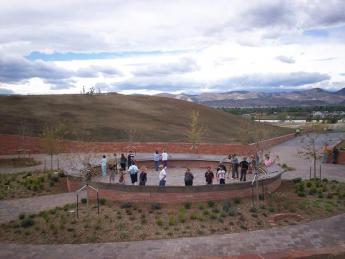
|
| Rebel Hill |
The father of our country was in retreat from the battle of Germantown, having crossed the river at Matson's Ford, then following Matsonford Road over and beyond the big hill, and pausing for water at the spring in the gulch formed by Gulch Creek, now more decorously called Gulph Creek. The creek tumbles down the side of a long ridge forming the south side of the Great Valley; the gulch or gulf is really a crevasse in that ridge, which in a sense makes Rebel Hill just a split-off extension of that ridge. Consequently, the gulch makes a water-level route from the Schuylkill to Valley Forge, which anyone would take to get there in a hurry. Valley Forge is a misleading term; it's a hill in the middle of the Great Valley, as the center of an angel food cake tin, and was thus defensible in all directions. The cleft in the southern ridge is where you would normally travel to get to the base of the bastion of Valley Forge.
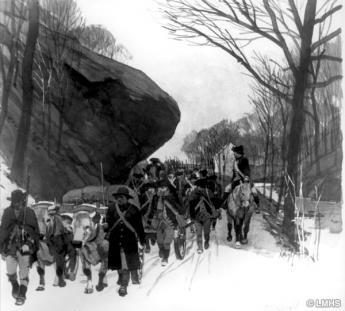
|
| Old Gulph Road |
So, everyone still takes that route, following Montgomery Avenue after it turns into South Gulph Road, but before it turns into North Gulph Road. The road up along the southern ridge is called Old Gulph Road, while the newer extension from the river is called New Gulph Road. All of these winding roads are compressed within the narrow defile beside Gulph Creek, reachable by splashing through the fords in the creek, although that is discouraged after ice forms in the winter. And, yes, a new road has come in at a restored old farmhouse, called New Gulph Road. The restoration has created a fancy restaurant, which somehow forgets that at the time we are talking about, it was the headquarters of (Major) Aaron Burr. The giant highway cloverleaf ahead on South Gulph Road tends to obscure the fact that it was the direct road to Valley Forge, now further obscured by lots of shopping center. If you persist and keep a lookout for the street signs, you will eventually get to the Memorial Arch, log cabins and National Park Service facilities of Valley Forge.
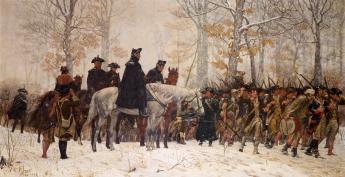
|
| Valley Forge |
Back in the gulch, however, is the spring where Washington's troops refreshed their canteens. Just beyond it is a great big rock, much mentioned in memoirs of the episode. Around 1950, the highway engineers decided to blast this rock out of the way of widening a road that badly needs widening. The Daughters of the American Revolution saved the day. Creating a giant fuss, the DAR succeeded in limiting the engineers to chiseling the bottom of the rock away. A gentleman in his eighties recently remarked he had driven past that rock thousands of times, and always wondered what it was there for. Now he knows.
Abortion
The official position of the Pennsylvania Medical Society on the topic of abortion is, we have no position on abortion. I ought to know because I was the author of this position, proposed at a moment when the PA Medical House of Delegates was obviously going nowhere. After two hours of angry debate, we had to stop before we split into two warring medical societies. The Pennsylvania delegation to the AMA was then obliged to hold the same no-position on a national level. As I recall, our position was likewise greeted by the AMA House of Delegates with great relief, and word quickly circulated in the corridors that Pennsylvania had a position everyone could endorse for the good of the organization. For several years, this no-position position was widely referred to whenever the topic threatened to arise. It almost invariably stopped the discussion in its tracks, as it was intended to do. In going back over the minutes, it would appear the AMA never actually voted to adopt a no-position motion, a discovery that surprised but did not change the basic determination to let the rest of the nation settle this. We were going to stay out of it.
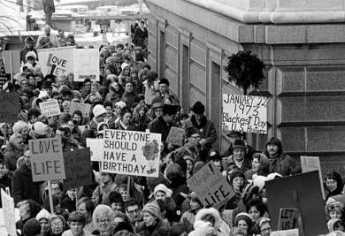
|
| Roe vs. Wade |
Because, one hundred forty years earlier, we started it. If you actually read Justice Blackmun's opinion for the majority in Roe v. Wade, as very few agitated proponents seem to have done, the original medical origin is clearly laid out. Blackmun had been a lawyer for the Mayo Clinic before his appointment to the Supreme Court, acquiring unusual medical resources and experiences for a lawyer. Now prepare for a logical leap, to the The Gross Clinic, Thomas Eakins masterpiece painting of Philadelphia's pre-eminent surgeon in a black frock coat, holding a dripping crimson scalpel in his bare hand, encapsulates the original situation. Note carefully that anesthesia is being given to the patient, but the surgeon is not wearing a cap, mask, gown, or rubber gloves.
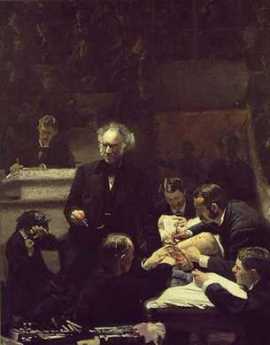
|
| Gross Clinic |
In 1850 medical science had progressed into a forty-year time window when anesthesia made abortions painless, but Pasteur had still not identified bacteria, and Lister had not devised a way to cope with them. Abortions, common in ancient Greece but forbidden by Hippocrates, suddenly were widely demanded by 19th Century women in a situation when their judgment was vulnerable. Abortions were easy to do, all right, but women died like flies from the resulting infections, and the American Medical Association was distraught about it. The Oath of Hippocrates was brought forward to emphasize its prohibition of abortion, and the performance was made unethical for a member of the Association, sufficient cause to warrant expulsion. When that proved inadequate, the delegates agreed to go to their local state legislatures and seek legislation prohibiting the performance of abortion by anyone, member or non-member of the Association. These laws were quickly passed, and it was the Texas version which was overturned by Roe v. Wade as an unconstitutional denial of privacy. Roe was a pseudonym for the patient, and Wade was then Attorney General of Texas, the officer charged with enforcing Texas law. By 1900 abortions became both easy and safe for the mother, and by 1911 the AMA had reversed its position. The scientific surgical situation is well illustrated by a later famous painting about Philadelphia surgery by Thomas Eakins, the Agnew Clinic, in which the surgical team is portrayed in its modern costume of sterile gowns and rubber gloves. But it didn't matter since by that time various churches had hardened their doctrines. Religious leaders and their constituent politicians simply no longer cared what the medical profession thought about it. For at least the following century, ideological combatants were plainly only interested in whether physician opinion might advance one side or the other of their argument with useful official statements. Our real position, if anyone cares, is that we started out seeking protection for the safety of the mother, but the issue got twisted by others into disputes about the welfare of the unborn fetus.
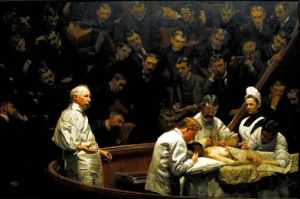
|
| Agnew Clinic |
Since this is the case, there plainly may be a reason for state legislatures to reconsider the state laws they passed in the 19th Century, during that forty-year window of time when the scientific facts were in transition. But when a leap is made by the appointed referees of the federal government to overturn state laws, even about a basically medical issue, there has to be some legal reason to intervene; a medical reason somehow doesn't count. Justice Blackmun's discovery of an unnoticed right to "privacy" in the Constitution, where the word does not appear, is just too hard for us non-lawyers to deal with. Suppose we leave the fine points of the Bill of Rights to those constitutional lawyers. What's at stake here, among other things, of course, is whether the Federal Courts are justified in overturning well-intentioned state laws which had served well for at least fifty years -- simply out of impatience with the sluggishness and political timidness of state legislatures to revise obsolete laws. That's unbalancing the Constitution for a comparatively minor cause. Even major cause is something we have agreed to adjust in other ways, by amendment, not judicial opinion. And that's my opinion, having comparatively little to do with abortion.
11 Blogs
IF ALL MEN WERE ANGELS, NO CONSTITUTION WOULD BE NECESSARY
 A lot of shrewd thinking went into the checks and balances of the Constitution, some of it in quaint language.
A lot of shrewd thinking went into the checks and balances of the Constitution, some of it in quaint language.
George Washington Demands a Better Constitution
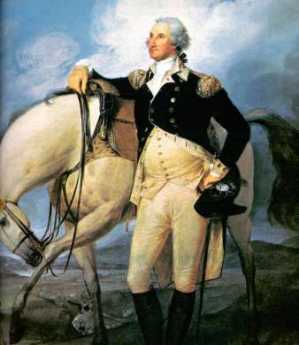 George Washington was an athlete, a soldier, and an adventurous leader. It is less appreciated that he constructed that aloof public image of himself, cloaking an activist politician and rather ambitious real estate developer. We got a new Constitution because he wanted a new constitution.
George Washington was an athlete, a soldier, and an adventurous leader. It is less appreciated that he constructed that aloof public image of himself, cloaking an activist politician and rather ambitious real estate developer. We got a new Constitution because he wanted a new constitution.
A Gleam in Washington's Eye
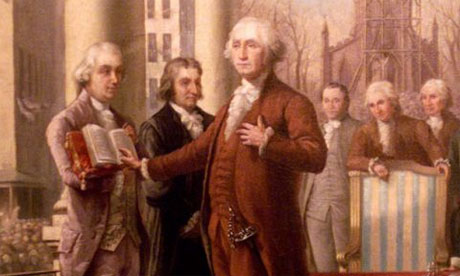 Section 8 of Article I of the Constitution contains the enumerated powers of Congress, and Section 9 contains some prohibitions of Congressional power. Taken together, these "powers" constitute the arguments that a Union is superior to a Confederation. In the aggregate, they represent the reasons why we created a Union.
Section 8 of Article I of the Constitution contains the enumerated powers of Congress, and Section 9 contains some prohibitions of Congressional power. Taken together, these "powers" constitute the arguments that a Union is superior to a Confederation. In the aggregate, they represent the reasons why we created a Union.
Robert Morris: Businessman Father of the Bureaucracy
 Only a few days after being appointed Financier, or acting President of the United States before the Constitution, Robert Morris swept away Congressional committees and replaced them with administrative employees.
Only a few days after being appointed Financier, or acting President of the United States before the Constitution, Robert Morris swept away Congressional committees and replaced them with administrative employees.
John Dickinson, Quaker Hamlet
 John Dickinson was the most respected lawyer and politician of his time. He had a lot to do with writing the Declaration of Independence but refused to sign it.
John Dickinson was the most respected lawyer and politician of his time. He had a lot to do with writing the Declaration of Independence but refused to sign it.
Constitutions: So What's So Good About Ours; Why Do Europe's Fail?
The American Constitution was created by a dozen successful men, opposed by a dozen others. Since it was a compromise, its balance may explain its endurance, once the Bill of Rights established minority protections.
What Is the Purpose of a National Constitution?
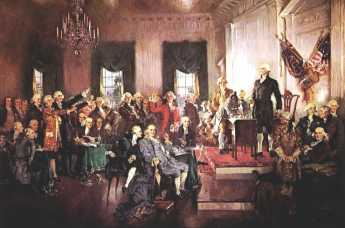 The primary purpose of any Constitution is of course survival. Usually, but not invariably, that means avoiding war with a neighbor which will surely beat you. Having stated what ought to be obvious, the framers of a Constitution need to be careful of the reasons which originally caused the new state to be formed, and also need to avoid provisions which would cause trouble by inciting some different type of governance. These features can be enumerated, but are easily forgotten.
The primary purpose of any Constitution is of course survival. Usually, but not invariably, that means avoiding war with a neighbor which will surely beat you. Having stated what ought to be obvious, the framers of a Constitution need to be careful of the reasons which originally caused the new state to be formed, and also need to avoid provisions which would cause trouble by inciting some different type of governance. These features can be enumerated, but are easily forgotten.
Inalienable Rights Before the Magna Carta
 Human rights of some sort can be traced back to 1800 B.C The question is not whether they are ancient, but who gave them out.
Human rights of some sort can be traced back to 1800 B.C The question is not whether they are ancient, but who gave them out.
Rebel Hill
 Everybody knows Washington's troops retreated to Valley Forge, but not everybody realizes how he got there.
Everybody knows Washington's troops retreated to Valley Forge, but not everybody realizes how he got there.
Abortion
 As I recall, our position was likewise greeted by the AMA House of Delegates with great relief, and word quickly circulated in the corridors that Pennsylvania had a position everyone could endorse for the good of the organization.
As I recall, our position was likewise greeted by the AMA House of Delegates with great relief, and word quickly circulated in the corridors that Pennsylvania had a position everyone could endorse for the good of the organization.